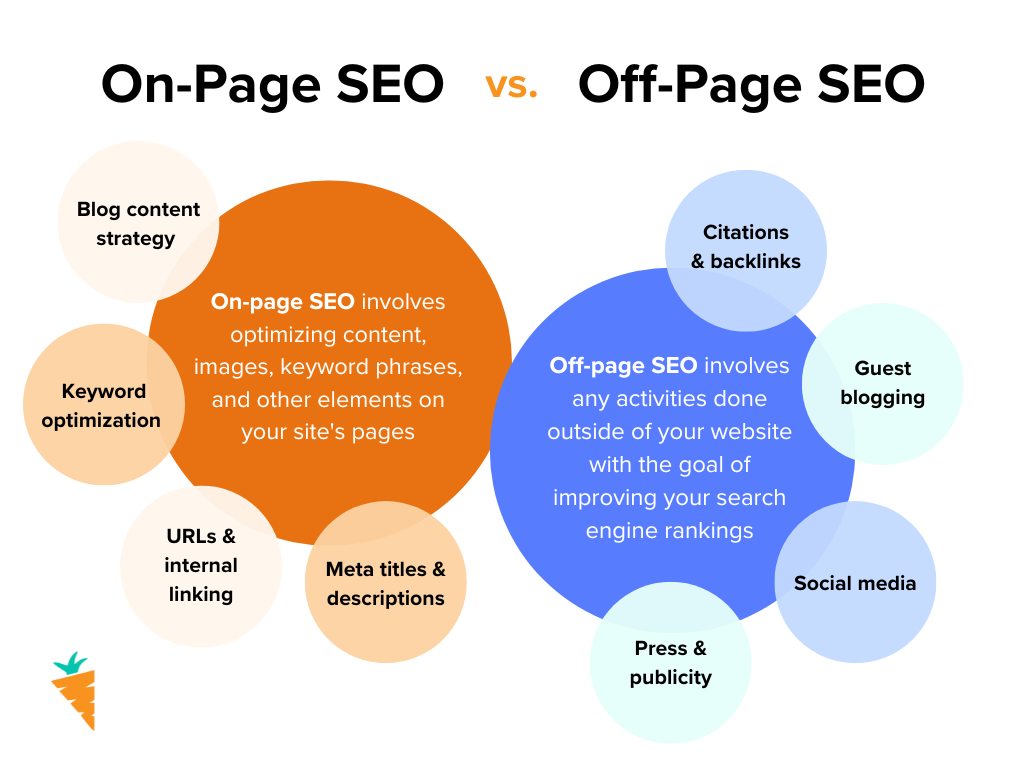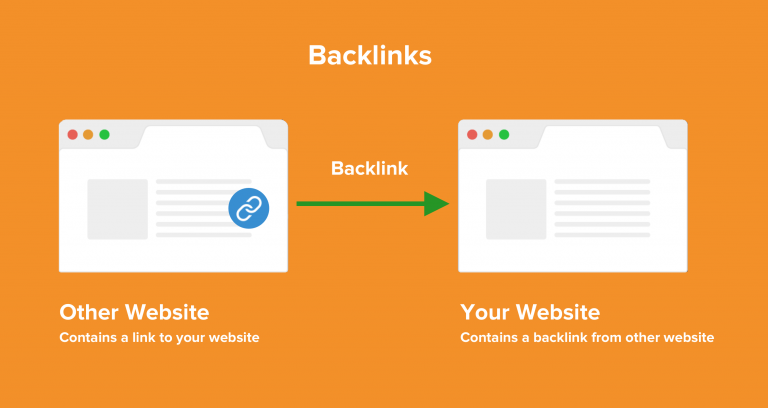Overview
As you work on improving your Google rankings, the first places we recommend you start are with keyword research, on-page SEO and content strategy. After optimizing your pages and creating some helpful content, you’ll want to spend some time on off-page SEO.
Off-page SEO (also known as off-site SEO) involves any activities done outside of your website that are meant improve your search engine rankings, create brand awareness, and drive referral traffic to your website from other sites.
This can include creating citations, link building, forums, influencer outreach, guest blogging, and offline marketing to name a few.
In other words: off-page SEO is all the stuff that you do externally to get Google and other search engines to see your website as trustworthy and authoritative. Anything you do to get people to search for your brand name or mention your brand online helps your site rankings.

Citations for Your Business
We recommend starting strong with off-page SEO by building citations for your business.
Citations are business listings for your site to build your credibility in the eyes of both search engines and your potential clients and customers. Read our tutorial to learn more:
Are you more of a hands-off person? Check out our in-house Citation Building Service!
PageRank & Your Domain’s Authority
PageRank is Google’s mathematical algorithm that scores websites based on the quality and quantity of backlinks pointing to them from other sites.
Google no longer shares this information publicly, but many SEOs believe that PageRank is still important to how Google ranks websites.
Since this information is no longer publicly available, other SEO tools can provide insights to how trustworthy and popular your domain is. For example, Authority Score is a proprietary metric from Semrush measuring your domain’s overall reputation and quality. You can monitor your website’s Authority Score using Carrot’s Backlink Analysis Tool.
Building Backlinks
After setting up citations, you’ll want to focus on building more relevant backlinks for your business.
What Are Backlinks?
Backlinks (also known as “inbound links,” “incoming links,” or “one-way links”) are links from one website to a page on another website.
Google and other major search engines consider backlinks “votes” for a specific page. Pages with high-quality backlinks tend to rank higher in organic search engine results.

Backlink Quality and Relevance
It’s important to focus on quality and relevance when building backlinks, rather than simply quantity or volume.
Backlink quality depends on several factors:
- Relevance – How closely the site and/or page aligns with the topic you are trying to rank for.
- Authority – How high is the domain authority of the referring site or page? Popular sites like Zillow, The New York Times or a local news outlet generally have more authority.
- Traffic & Engagement – A backlink that sends real visitors to your website who interact with your content is usually better than a backlink that sends zero traffic back to your site.
- Site Architecture – Links from subdomains or buried pages (multiple steps from the home page) generally pass less “link juice” than a backlink from another website’s homepage.
- Link Attributes – Special link attributes such as
sponsored,ugc, andnofollowprovide information to Google to help it understand if links are advertising-related or sponsored. Anofollowattribute tells Google to not give as much weight to the link. Most citations arenofollow– they’re still good to have, but will pass less “link juice” than a regular link without that attribute. Learn more at Google Search Central
Backlinks are not always forever, they can have a lifespan. A website may remove a page containing a backlink. A site or page may get deleted or de-indexed. A backlink’s relevance and authority can go up and down as the page they are placed on changes.
Which Backlinks Should Be Avoided?
Recently leaked Google documentation suggests that Google is probably ignoring links that don’t come from a relevant source. It also suggests that Google penalizes “bad” or “toxic” backlinks that are irrelevant to your business.
You want links from relevant pages that will drive qualified traffic (real people who will engage with your content) to your site.
You don’t want links from websites on the other side of the world that have nothing to do with the topic of your site, as these types of backlinks can often do more harm than good.
We don’t recommend buying backlinks from unverified websites, using PBNs (private blog networks), or purchasing cheap backlinks from sites like Fiverr. While these methods may give you a quick boost in rankings, they are likely to backfire in the long run.
Building high-quality, relevant backlinks isn’t easy. If it sounds too good to be true, it probably is.
Learn more about how to stay away from harmful backlink services:
- How to spot and avoid shady link building vendors – via Search Engine Land
How To Get Quality Backlinks
Here are a few ideas to get relevant backlinks for your business:
- Create link-worthy content – Create helpful, high-quality unique content on your site that people will naturally want to link to.
- Guest blogging – Write articles for other relevant blogs and include a link to your website. Check out this article to learn more about what types of guest blog posts get indexed by Google.
- Profiles on relevant forums – Join forums and online communities relevant to your business, where you can often create a profile and add a link to your website. For example, BiggerPockets, Connected Investor and Active Rain are relevant for real estate businesses.
- Sponsor & support local orgs – Partner with other relevant businesses, charities or organizations in your local area to provide a link back to your website. Look for relevant local events, sports teams, or good causes, and ask for backlinks and mentions on their website as part of your sponsorship package.
- Local press & publicity – Seek out press and PR opportunities from local news media and develop relationships with local journalists. Find a newsworthy “hook” and research the local newspaper and television reporters who may be interested in your topic.
- National media mentions – Tools like Help a Reporter Out (HARO), Source of Sources and Qwoted can help you connect with relevant journalists who write for industry publications and websites.
- Podcast appearances – Position yourself as an expert in your niche by appearing as a guest on podcasts. You can use tools like The Podcast Network Directory or the Need A Guest Facebook group to find relevant podcasts to pitch yourself to. You can also create your own podcast as a way of link building. Check out this article to learn more: How to use podcasts for natural link building
Check out these resources for more tips on how to build backlinks to your website:
- How to Use HARO to Get Backlinks
- 5 Backlink Building Pro Tips for Faster SEO Results w/ Keith Sant & Bryan Driscoll
- Creative Backlinking to Maintain Google Rankings in Competitive Markets w/ Greg Gaudet
- VIDEO: Building Your First Backlinks & Citations
Building Your First Backlinks & Citations
In this video, Trevor and Brady discuss how to get backlinks, how many you need to rank, buying vs building, and creative ways to get high-authority backlinks with less effort. Listen in!
Social Media Signals
While social media signals are not a direct ranking factor, they can play an indirect role in improving your search engine visibility. Mentions from social media accounts can help boost brand recognition and credibility for your company.
With social media platforms like Facebook, you can get reviews for your business and share blog content from your website.
Some social media platforms like YouTube and Pinterest are also search engines themselves! You can leverage them alongside evergreen content from your blog or website:
- Create a Pinterest-friendly image for your blog post and add it to Pinterest for a nofollow backlink. Canva offers lots of Pinterest pin templates to make creating these graphics easy.
- Make a VideoPost and share helpful information about your niche expertise via both video and written blog content. Embed the YouTube video in your blog post, and link to your blog post from the video description on YouTube.
Learn more about leveraging social signals to boost your SEO:
- How To Automate Blog Post Sharing to Your Facebook Business Page
- Social Signals & SEO: Do Shares + Likes Help You Rank Higher? – via Semrush
- The What, Why, & How of Social Bookmarking – via HubSpot
- How SEOs can Generate Traffic and Backlinks with Pinterest – via HigherVisibility
- The ultimate guide to Pinterest marketing – via Canva
Conclusion
Off-page SEO takes time and building high-quality, relevant backlinks isn’t easy. But it’s worth the effort! Creating brand awareness and building trust for your business through off-page SEO should be part of your overall marketing strategy.
You can monitor your SEO efforts with Carrot’s built-in tools or join Carrot’s official Facebook community to ask questions and share tips about what’s working best for you.

